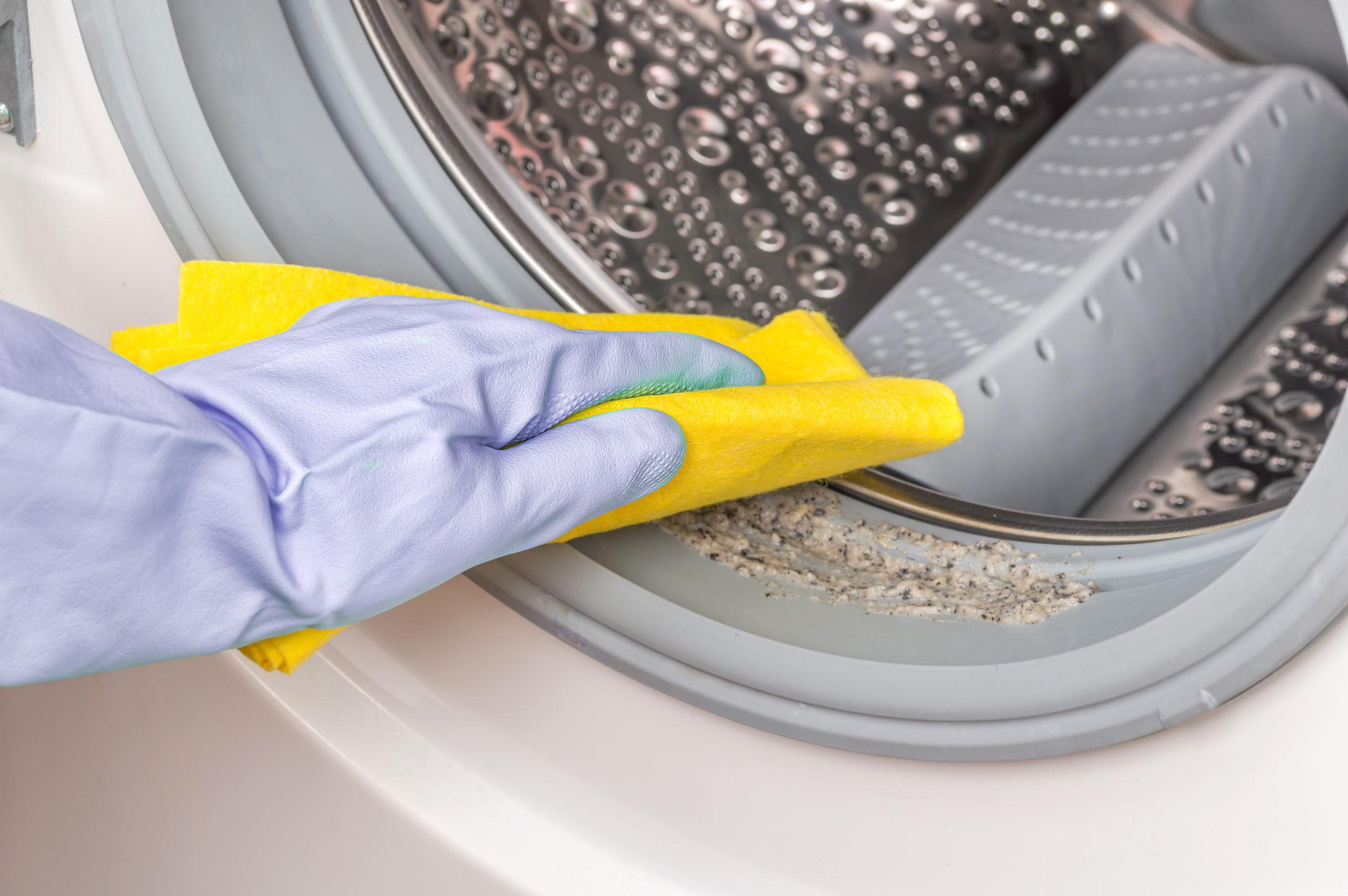

Hands up who regularly cleans their washing machine. It’s an often-forgotten job but one which is absolutely crucial to getting fresh-smelling laundry. In this helpful guide, we’ll take you through the process of making sure your washing machine is as spotlessly clean as it can be.
Whether it’s giving the drum a really good clean, releasing the dirt and grime in your filter, or removing your detergent drawer and cleaning it in the sink, this guide will help eliminate the main causes of a musty, mouldy smelling washer.
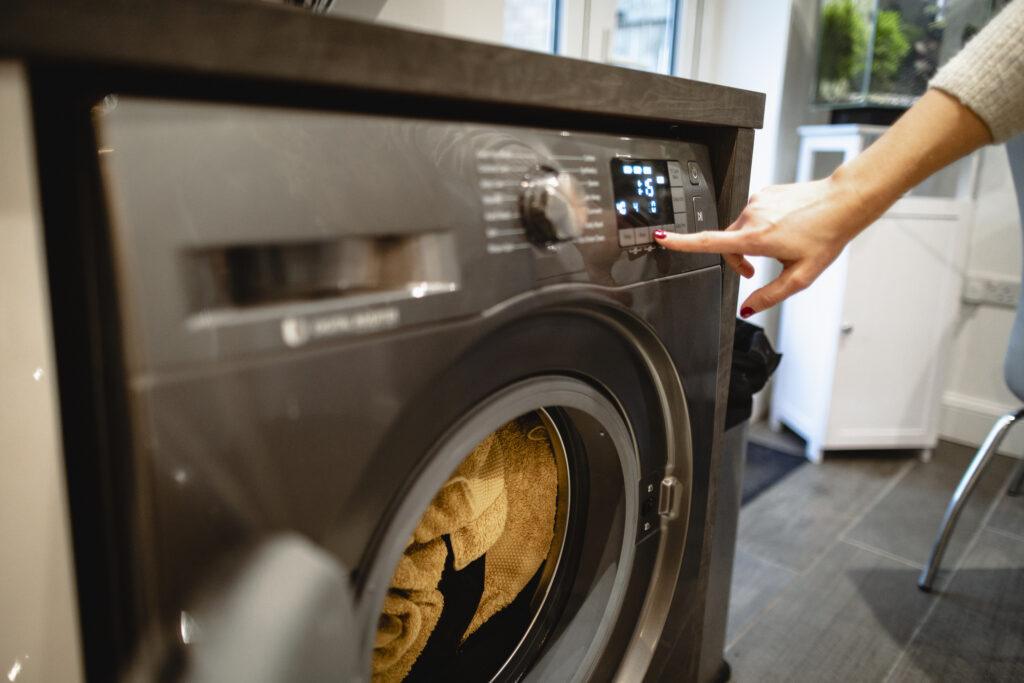
Thankfully, cleaning your washing machine isn’t as difficult or time consuming as you might have been led to believe.
If you are looking for more cleaning tips, head over to our blog for helpful guides on various topics.
How to clean a washing machine drum
The drum of your washing machine goes through a lot. Tumbling and turning as it agitates your clothes, removing stains and nasty smells, this is your first port of call for a thorough washing machine clean.
There are a number of cleaning products available that you can simply add straight to your drum to give it a freshen up every month or so. These are usually used alongside a hot wash to circulate around your drum and air it out.
There are a couple of things you can do to keep your drum sparkling clean and smelling great.
- Keep the door open. In between washes, keep your washing machine door ajar. This helps reduce the build-up of bacteria which causes that nasty damp, musty smell.
- Brush off excess dirt. Washing machines are incredibly handy but brushing off excess grime and dirt (including debris in the rubber door seal) before adding a new load to the machine will reduce the need to clean it more often.
Of course, if you prefer not to buy lots of products for one purpose, you could clean your drum with a dishwasher tablet. Simply pop a dishwasher tablet into your drum and the run machine empty on a hot wash or on the machine’s self-clean setting.
Alternatively, add a capful of a fragranced disinfectant and follow the same process. After the wash has finished, you’ll find your drum sparkling clean, smelling absolutely fantastic and free of accumulated moisture and detergent residue.
How to clean washing machine seals
The rubber seals of your washing machine are often forgotten, but they could be the cause of that nasty smell you’ve noticed coming from your machine.
Your seals stop leaks but can also harbour items that you have accidentally left in your pockets – so carefully look in and around your seal to see if any coins, tissues or hair clips have been hiding in them. It’s a good idea to check this regularly as seals can be susceptible to puncturing from foreign objects.
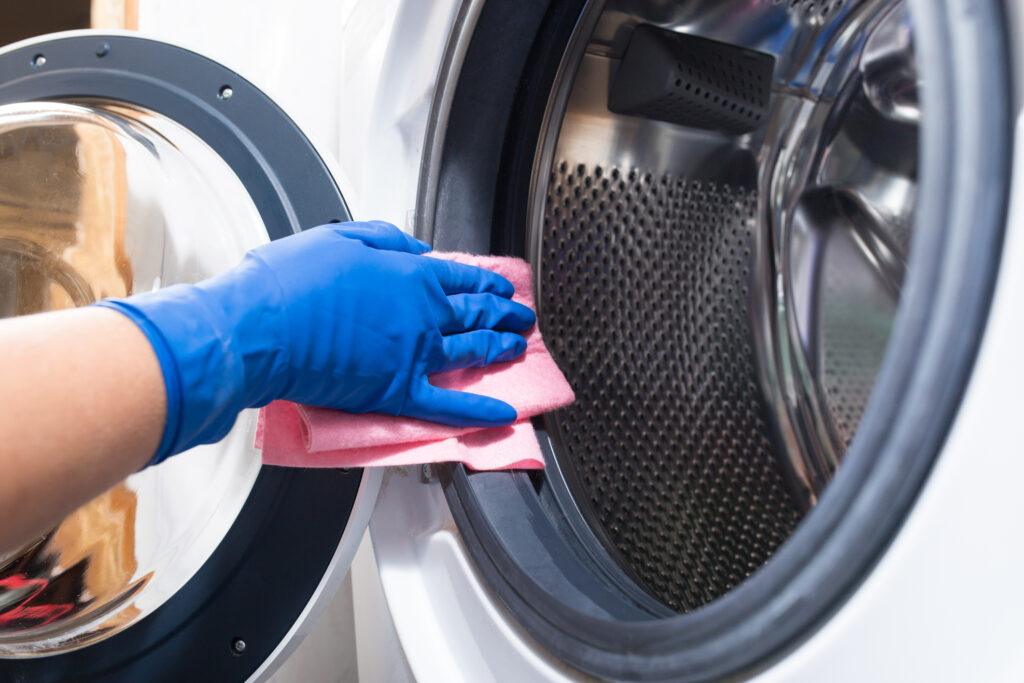
To clean your washing machine seals thoroughly, simply follow the steps below:
What you will need
- Damp cloth, soaked in lightly soapy water.
- Bowl or bucket of water to rinse.
- Towel to place on the floor to catch spillages/debris.
How to clean the seals
- Put your towel on the floor in front of your washing machine to catch any excess water or objects that you might find.
- Using your damp cloth, wipe around the rubber seal of the washing machine.
- Rinse your cloth every so often in the clean water.
- Repeat the process as needed until your cloth comes up clean.
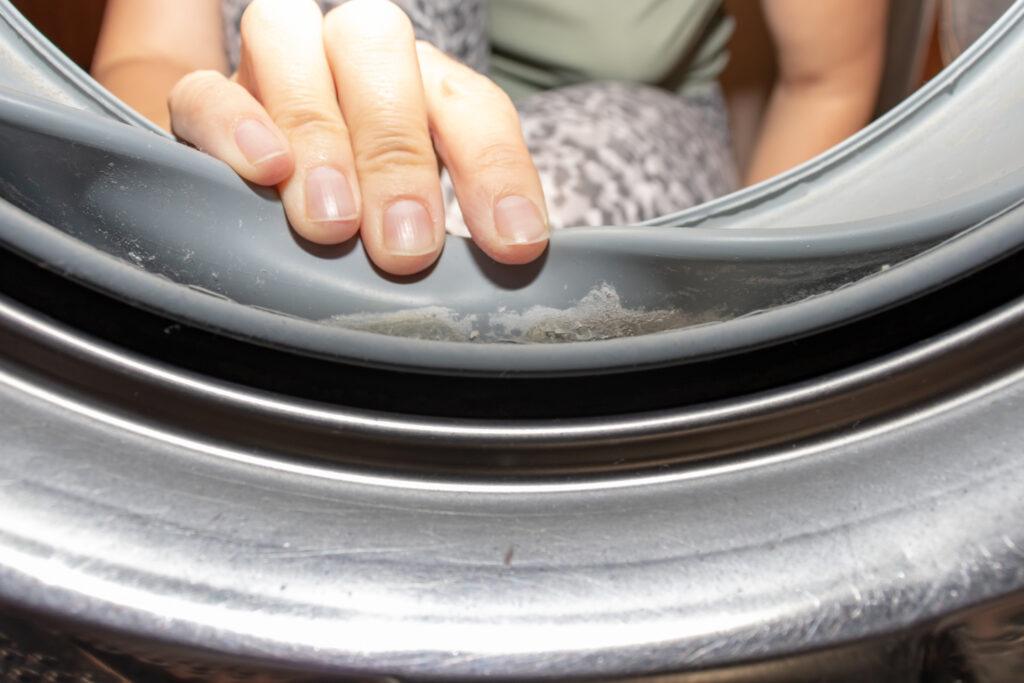
Be careful when cleaning your seals as it is possible for them to come loose from the metal casing of the washing machine.
How to clean a washing machine filter
Cleaning your washing machine filter is really important. Effectively, it acts as a barrier to stop any foreign objects (coins, clips, tissues, fluff and hair) from reaching your pump, where they can cause a lot of damage.
To clean your washing machine filter, just follow the below steps:
What you will need
- Baking tray or shallow dish to catch any excess water.
- Towel to soak up any excess water or dirt.
- Bowl of warm soapy water.
- Clean sponge.
How to clean the filter
- Place your towel on the floor next to your washing machine, and gently slide your baking tray or dish under the filter and slightly underneath the machine body.
- Remove the filter cap from the machine. If unsure where this is, refer to your user manual.
- Carefully unscrew the filter from its housing.
- You’ll notice some excess water will empty from the machine and into your tray – this is completely normal.
- Take the filter and wash it in the bowl of soapy water.
- Use your sponge to wipe away any hard to remove grime and debris.
- Return your filter to the housing by screwing it back into the machine.
- Replace the filter cap carefully.
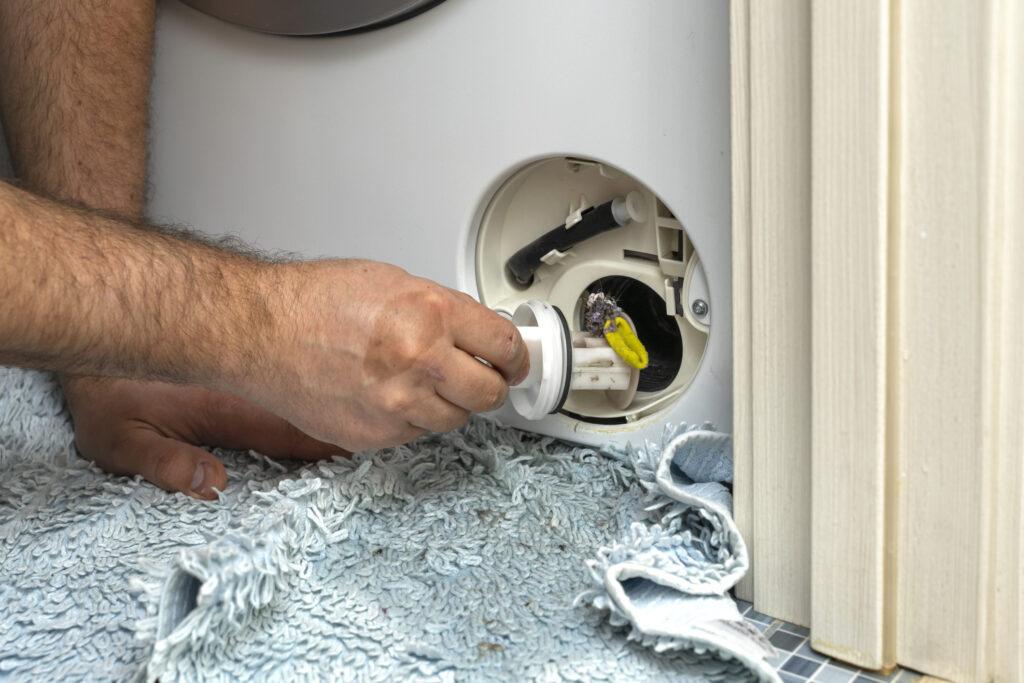
Where is my washing machine filter?
Your washing machine filter is usually located at the bottom of your machine, very close to the floor, and underneath the drum door. It should look like a small flap that when removed reveals the filter. Refer to the user manual if you’re unsure.
How to clean a washing machine’s detergent drawer
As this is where you add your softener and powder, your detergent drawer gets very dirty very quickly. Therefore, it’s important to keep this as clean as possible so that any grime in your drawer doesn’t migrate down into the drum.
To get your detergent drawer sparkling clean, follow the steps below:
What you will need
- Warm soapy water
- Clean sponge
- Dry cloth
How to clean the drawer
- Fill up a bucket or your sink with warm soapy water.
- Remove your detergent drawer from the machine housing.
- Submerge the drawer in the soapy water and scrub away any grime using your sponge.
- Once you’re pleased with the results, dry the drawer using your cloth or leave to air dry.
- Return the drawer to the machine, and ensure it securely locks into place, usually with a click.
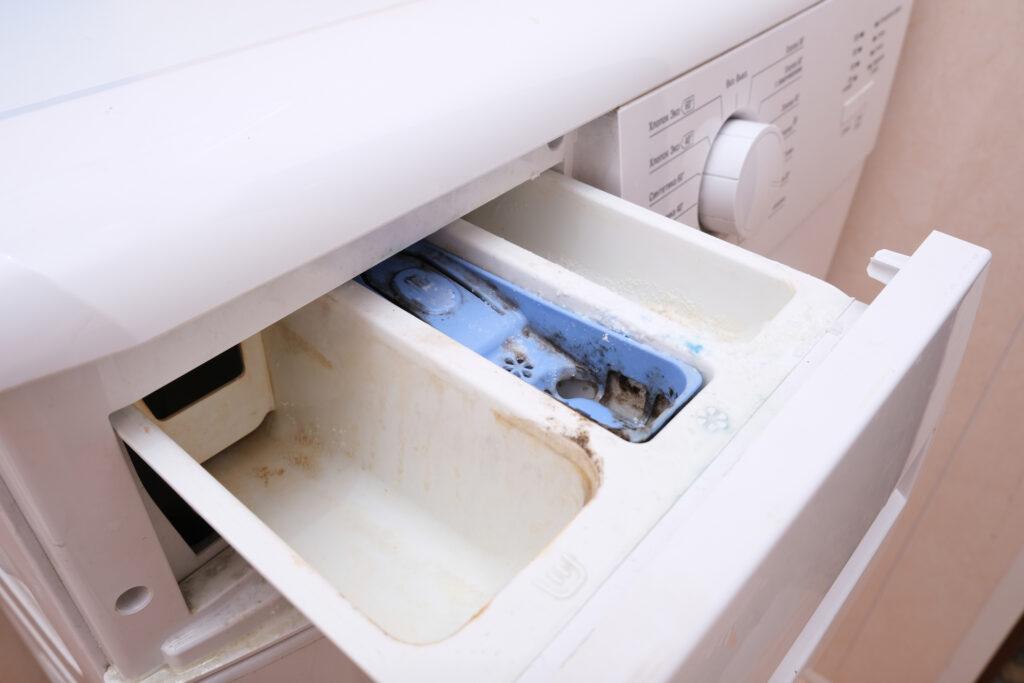
How to remove a washing machine drawer
It is a lot easier to remove your detergent drawer than you might think, but your washing machine user manual should be available online if you need to check. Usually, above the central compartment of the drawer unit, there will be a button which will release it from the machine.
How to descale a washing machine
Descaling your washing machine can be as simple as adding some white vinegar into your detergent drawer and running an empty hot wash – this will help remove any limescale build-up and keep it smelling fresh.
There are also a number of products available from DIY stores, supermarkets and homeware stores to remove limescale from your machine and keep it running smoothly for years to come.
Limescale is particularly prevalent in hard water areas and can cause havoc for your appliance. If left unchecked, limescale in a washing machine can damage garments and break the heating element – resulting in costly repairs of potentially more than £100, according to the UK’s consumer champion, Which?
Cleaning the outside of your washing machine
Cleaning the outside of your washing machine is more of an aesthetic choice, as a clean and sparkling machine is much more pleasing to the eye than one that has dirt and grime on it.
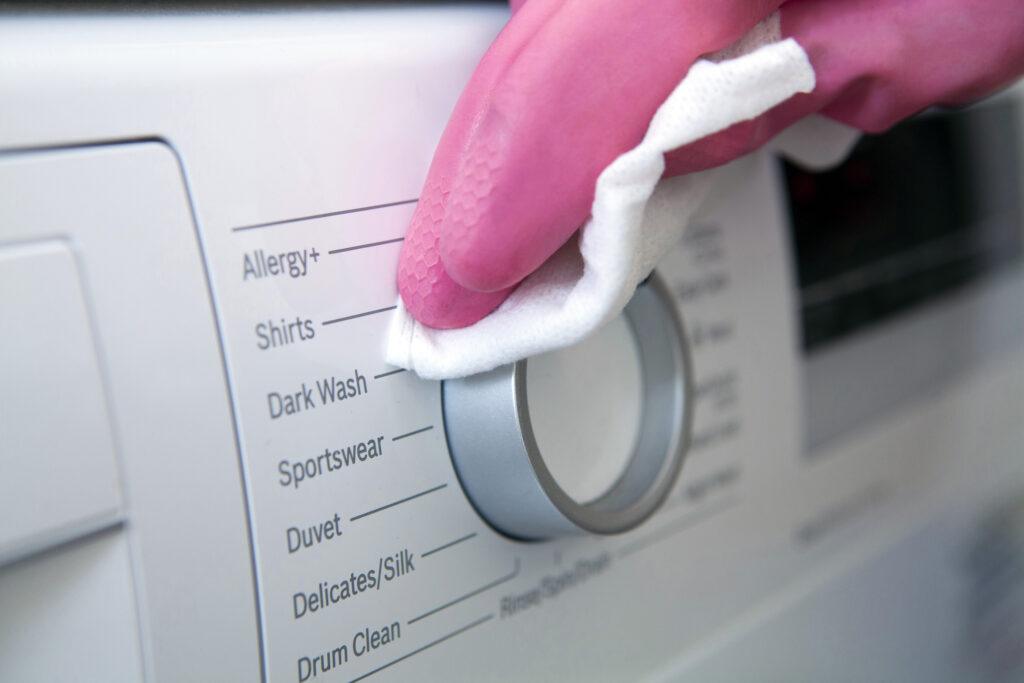
To clean the outside of your washing machine, simply take a bowl of warm soapy water and a lightly damp cloth, wiping in and around the machine – not forgetting to clean the glass in your door and around the control panel.
How to remove hard water stains from washing machines
Hard water stains are an unsightly problem in areas that suffer from hard water. You can use our hard water checker to check your own home – all you need to do is enter your postcode or town to discover the scale of the problem.
If you’ve noticed a build-up of hard water stains on your machine, depending on how long they have had chance to settle, a simple wipe with a soft cloth could be enough. If they’re a little more caked on, there are a number of products available that can tackle limescale and hard water stains.
For a more permanent solution, you could introduce a water softener to your home. A water softener is designed to remove calcium and magnesium from your water supply, the two minerals that contribute to hard water which will eliminate limescale once and for all meaning less elbow grease when cleaning your washing machine.
You can learn more about the benefits of owning a water softener with a washing machine in our dedicated blog post.


